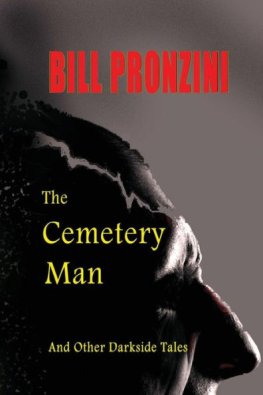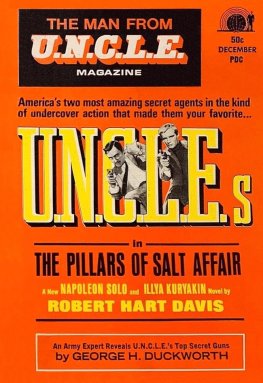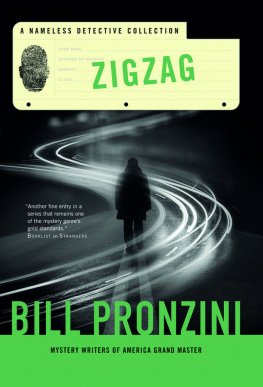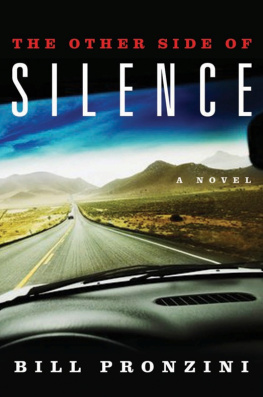Bill Pronzini - Nightshades
Here you can read online Bill Pronzini - Nightshades full text of the book (entire story) in english for free. Download pdf and epub, get meaning, cover and reviews about this ebook. genre: Detective and thriller. Description of the work, (preface) as well as reviews are available. Best literature library LitArk.com created for fans of good reading and offers a wide selection of genres:
Romance novel
Science fiction
Adventure
Detective
Science
History
Home and family
Prose
Art
Politics
Computer
Non-fiction
Religion
Business
Children
Humor
Choose a favorite category and find really read worthwhile books. Enjoy immersion in the world of imagination, feel the emotions of the characters or learn something new for yourself, make an fascinating discovery.

- Book:Nightshades
- Author:
- Genre:
- Rating:3 / 5
- Favourites:Add to favourites
- Your mark:
- 60
- 1
- 2
- 3
- 4
- 5
Nightshades: summary, description and annotation
We offer to read an annotation, description, summary or preface (depends on what the author of the book "Nightshades" wrote himself). If you haven't found the necessary information about the book — write in the comments, we will try to find it.
Nightshades — read online for free the complete book (whole text) full work
Below is the text of the book, divided by pages. System saving the place of the last page read, allows you to conveniently read the book "Nightshades" online for free, without having to search again every time where you left off. Put a bookmark, and you can go to the page where you finished reading at any time.
Font size:
Interval:
Bookmark:
Bill Pronzini
Nightshades
CHAPTER ONE
Barney Rivera said cheerfully, The name of the place is Ragged-Ass Gulch.
I just looked at him.
Well, that was the name it was born with, anyhow, he said. Back in the days of the Gold Rush. Nowadays its called Musket Creek.
Uh-huh. And nowadays its a ghost town?
Sort of. Sixteen people live there.
Uh-huh, I said again. Where did you say it was?
Trinity County, north of Weaverville.
Thats not Mother Lode country.
Not exactly, no. Everybody thinks the Gold Rush was limited to the Mother Lode, but in the early eighteen-fifties it raged up around Mount Shasta too. Ragged-Ass Gulch was a real boom town in those days.
Why Ragged-Ass Gulch? I asked him. The name, I mean.
He shrugged. Who knows? Miners used to give towns names like that back then. You know, colorful. Whiskeytown, Lousy Ravine, Bogus Thunder, Git-Up-And-Git-names like that.
You been doing some homework, huh, Barney?
You know me, he said. Conscientious to a fault.
Well, I did know him and he was conscientious. Id thought at first that he might be putting me on a little, because he had a somewhat flaky sense of humor, but what hed been giving me was straight goods. He had my attention, too, in spite of myself. I had come here out of professional courtesy, with half a mind to turn down whatever job he offered me, no matter what it was; I was planning to leave on vacation tomorrow, Friday. But it takes a different and less romantic type than me not to be interested in a case involving a semi-ghost town with the slightly bawdy name of Ragged-Ass Gulch.
We were sitting in Barneys office at the San Francisco branch of Great Western Insurance. The office was on the twenty-ninth floor of one of the buildings in the Embarcadero Center, and through the windowed wall behind his desk you could see all the way across the Bay to Mount Diablo. Or you could have if a thickish haze hadnt been choking off some of the early May sunshine and obliterating parts of Oakland and the other East Bay cities. It was a nice view, and a nice office, too, as befitted Great Westerns chief claims adjustor.
Barney himself fit the title just fine; in addition to being conscientious, he was shrewd, tenacious, and healthily skeptical. The only thing wrong with him was that he didnt look like a chief claims adjustor. Maybe it was just me; maybe I had seen Double Indemnity too many times and I expected all claims adjustors to look like Edward G. Robinson playing Keyes, or at least Fred MacMurray as Walter Neff. But here was Barney, five feet two in his stocking feet, tubby, with a mop of unruly black hair and shiny cheeks he had to shave every other Cinco de Mayo, peering at me doe-eyed from behind his massive desk like a kid playing executive. You wanted to reach over and pat his head and give him a quarter so he could go out and buy himself a Clark Bar. He was so damned cute and cuddly half the women who worked for Great Western felt like bundling him up and taking him home. Some of them did, too, and not for milk and cookies. For a fat little guy in his forties, Barney Rivera got laid pretty often-more than ninety percent of the hot-blooded young three-piecers who prowled the singles bars, anyway. Id known him ten years and it had been that way the whole decade. A legend in his own time, old Barney.
He reached out and scooped up a couple of peppermints from the dish on his desk and popped them into his mouth. Peppermints, yet. Keyes would have lighted a cigar or a pipe; Keyes would have sneered a little and shuffled a few papers and said something wise about the detection of insurance fraud. Peppermints. The whole thing just didnt seem right.
I said, How long has Ragged-Ass Gulch been a ghost?
Most of this century, Barney said. It flourished for three or four years in the eighteen-fifties; had a population of fifteen hundred at its peak. But then the gold petered out and the miners left for other diggings. There were only a hundred or so people left by eighteen-sixty.
When did it get renamed Musket Creek?
Sometime in the sixties; after the creek that runs through the place. By the turn of the century, only about thirty people were left. Sixteen today, like I said-living up there in virtual isolation.
Why?
Why what?
Why do they live there? Gold-hunters?
A couple of them, I gather, Barney said. But thats not important. The one thing they all have in common is that they like living in isolation and want to be left alone; and thats the crux of the problem-they arent being left alone.
So whos bothering them?
A group of developers called the Northern Development Corporation, Barney said, and went on to lay out the full story for me. It went like this:
Musket Creek, nee Ragged-Ass Gulch, was some two hundred and fifty miles north of San Francisco, twenty miles from the nearest town of any size, Weaverville, and at the end of seven miles of unpaved road that snaked through the mountains off State Highway 299. The tourists hadnt discovered it because it was so far off the beaten track, but that was all about to change if Northern Development had its way.
Most of the land in the area was government protected-the Shasta-Trinity National Recreation Area-but the land on which Musket Creek sat was owned by Trinity County. The Northern people had begun buying it up during the past year, with the intention of turning Musket Creek into a place the tourists would flock to: widening and paving the access road; restoring the rundown buildings that still stood there, after the fashion of the gaudier Mother Lode towns; adding things like a Frontier Town Amusement Park, stables for horseback rides up into the wilderness, and a couple of lodges to accommodate vacationers and overnight guests.
The Musket Creek residents were up in arms over this. They didnt want to live in a tourist trap and they didnt want to be forced out of their homes by a bunch of outsiders. So they had banded together and hired a law firm to try to block development and further land sales; to get Musket Creek named as a state historical site. Lawsuits were still pending against Northern Development, but the residents were pessimistic; they figured it was just a matter of time before the bulldozers and workmen moved in and another little piece of history died and was reincarnated as a chunk of modern commercialism.
One of them seemed to have been unwilling to accept that fate, however, and had taken matters into his own hands. Four of the towns abandoned buildings had burned to the ground ten days ago, including the remains of a fandango hall-a saloon-and-gambling house-that the developers had been particularly interested in restoring. The Northern combine thought it was a blatant case of arson, and had put pressure on the county sheriffs department to investigate; but the law had found no evidence that the fire had been deliberately set, and the official report tabbed it as of unknown origin.
Bad feelings were running high by this time, on both sides. And they got worse-much worse. Two days ago, there had been another fire, not in Musket Creek this time but in Redding thirty miles away, where Northern Development had its offices. The home of the president of the corporation, a man named Munroe Randall, who had also been the most outspoken against the citizens of Musket Creek, had gone up in flames shortly before midnight. Randall had gone with it. He was not supposed to be home that night-it was common knowledge that he was going to San Francisco on company business-but hed put off the trip at the last minute. He had evidently been asleep when the blaze started, and was overcome by smoke before he could get out of the burning house. There was no apparent evidence of arson; as far as the local authorities were concerned, his death was accidental.
Font size:
Interval:
Bookmark:
Similar books «Nightshades»
Look at similar books to Nightshades. We have selected literature similar in name and meaning in the hope of providing readers with more options to find new, interesting, not yet read works.
Discussion, reviews of the book Nightshades and just readers' own opinions. Leave your comments, write what you think about the work, its meaning or the main characters. Specify what exactly you liked and what you didn't like, and why you think so.

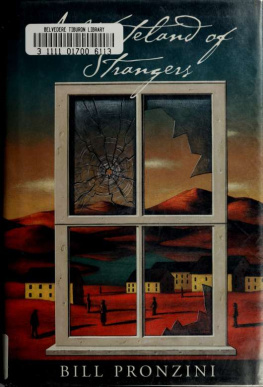
![Bill Pronzini - Sleuths [short story collection]](/uploads/posts/book/922610/thumbs/bill-pronzini-sleuths-short-story-collection.jpg)
